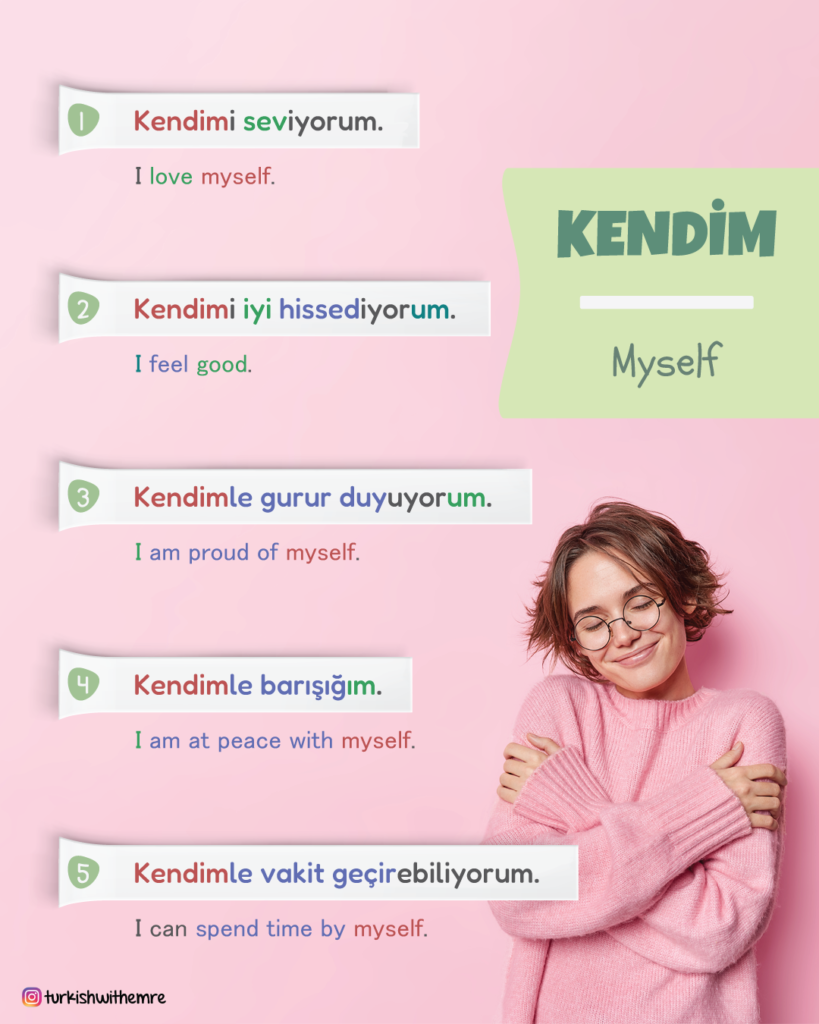Reflexive Pronouns in Turkish
Greetings, fellow Turkish learners! Today, we delve into the world of reflexive pronouns, those words indicating an action directed back at oneself. While English uses various pronouns like “myself” and “herself,” Turkish offers a simpler approach. Get ready to master “kendi”!
Forming Reflexive Pronouns in Turkish
Turkish primarily uses the stem ” kendi “ to form reflexive pronouns. This stem acts like a chameleon, taking different forms based on the person and number involved:
- Singular:
- Kendim (myself)
- Kendimi iyi hissediyorum. (I feel good.)
- Kahvemi kendim yaptım. (I made my coffee myself.)
- Bu soruyu kendim çözeceğim. (I will solve this question myself.)
- Kendimle gurur duyuyorum. (I am proud of myself.)
- Her şeyi kendim hallettim. (I handled everything myself.)
- Kendim (myself)

- Kendin (yourself)
- Yarın kendin gelebilir misin? – Can you come tomorrow yourself? )
- Kararını kendin ver. (Make the decision yourself.)
- Kendinle gurur duymalısın. (You should be proud of yourself.)
- Bu işi kendin halledebilirsin. (You can handle this yourself.)
- Kendin pişir, kendin ye. (Cook it yourself, eat it yourself.)
- Kendisi (himself/herself)
- Ayşe kendisiyle gurur duyuyor. (Ayşe is proud of herself.)
- Ali her şeyi kendisi yaptı. (Ali did everything himself.)
- Emre kendisine yeni bir araba aldı. (Ayşe bought herself a new car.)
- Doktor hastaya kendisine iyi bakmasını söyledi. (The doctor told the patient to take care of themselves.)
- Konuyu kendisiyle konuştum. (I talked to them about the issue.)
- Plural:
- Kendimiz (ourselves)
- Kendimize güveniyoruz. (We trust ourselves.)
- Bu soruyu kendimiz cevaplayabiliriz. (We can answer this question ourselves.)
- Kararı kendimiz verdik. (We made the decision ourselves.)
- Her şeyi kendimiz yaptık. (We did everything ourselves.)
- Kendiniz (yourselves)
- Kendinize iyi bakın! (Take care of yourselves!)
- Kendinizi fazla yormayın. (Don’t tire yourselves out too much.)
- Kendinize güvenin! (Believe in yourselves!)
- Bu görevi siz kendiniz halledebilirsiniz. (You can handle this task yourselves.)
- Kendiniz sordunuz mu? (Did you ask the doctor yourselves.)
- Kendileri (themselves)
- Çocuklar ödevlerini kendileri yaptılar. (The children did their homework themselves.)
- kendilerini geliştirmeliler. (They should develop themselves.)
- Lütfen kendilerini rahat hissetsinler. (Please make themselves feel comfortable.)
- Kendimiz (ourselves)
Remember: “Kendisi” is used specifically for the 3rd person singular and adds a nuance of respect or formality.
Using “kendi” in Action:
- Reflexive Actions: We use “kendi” when the subject and object of the sentence are the same person.
- Ali kendini aynada görüyor. (Ali sees himself in the mirror.)
- Osman kendini traş ediyor. (Osman is shaving himself.)
- Emphasizing Ownership: It can also be used with possessive suffixes to indicate belonging to oneself or yourselves. For example:
- Kendi kitabım. (My own book)
- Bu kitap kendime ait. (This book belongs to me.)
- Onlar kendilerine yeni bir ev aldılar. (They bought themselves a new house.)
- Kendi kalemlerinizi kullanabilirsiniz. (You can use your own pens)
Turkish Reflexive Pronoun Quiz: Test Yourself!
Results
#1. Ali her gün _____ tıraş ediyor. ( Ali shaves himself every day.)
#2. Biz _____ hazırlamalıyız. (should prepare ourselves)
#3. Sen yarın _____ okula gidebilir misin? (can go to school tomorrow yourself)
#4. ______ Sev. (Love yourself)
#5. ben _______ geleceğim. (I will come by myself)
#6. _______ için ( for themselves)
Mastering reflexive pronouns in Turkish is a crucial step towards fluency. By understanding how they are formed and when to use them, you can enhance your proficiency in the language and communicate more effectively. Keep practicing, stay curious, and don’t be afraid to make mistakes. Happy learning!




